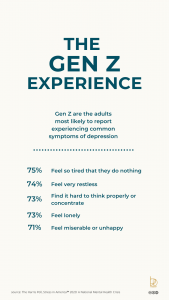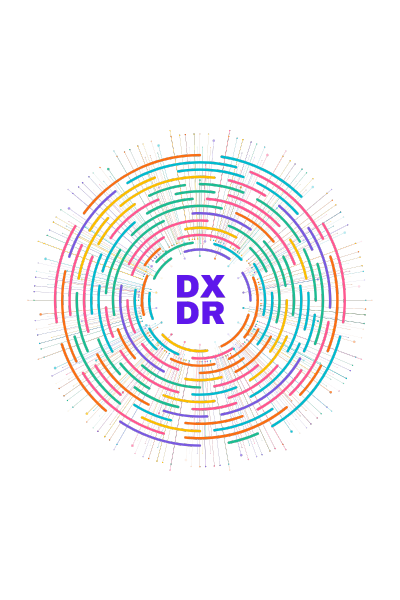Mental Health in the Workplace: Through the Lens of Gen Z

In this series of articles, we will cover the changes that need to be made in the workplace through the lens of Gen Z.
If it wasn’t clear before the COVID-19 pandemic, it is now: our systems of work are broken, and need to change. As discrimination, inequality, terrorism, poverty, disease, and injustice are at the forefront of public debate, the systems that have been in place for generations are beginning to crumble. While taxing on mental health and financial security, the pandemic that spread throughout 2020 slowed things down just enough for many of us to recognize the flaws within these systems.
More specifically, in the workplace.
Who is Gen Z? Born 1997-2012; 68M of US Population
Assessing the Damage
The standard work week, the proverbial grind and hustle culture is one that no longer serves us – especially those within Generation Z. Yet, we are expected to return back to normal and integrate back into these old systems of work. The stress of working a grueling 40+ hour work week with little to no flexibility is only damaging to the mental health of workers.
In the 5 Reasons Why HR Must Take Mental Health Seriously, a 2020 study conducted by Oracle, when looking at the importance of employee mental health:
78% of the workforce said the pandemic had negatively affected their mental health
85% said that their mental health issues at work negatively affected their home lives
76% believed that their companies should do more to support their mental health at work
As a member of Generation Z, I can tell you that our motivation to sacrifice our lives for an unfair system of labor is only diminishing.
Mental Health + Stress
As rates of both anxiety and depression increase among Generation Z [in the U.S.], the ability to speak freely and openly about our struggles is important. In the Stress in AmericaTM 2020: A National Mental Health Crisis study, conducted by The Harris Poll on behalf of APA, we see that 34% of Gen Z adults report worse mental health than in prior years and are the most likely to report experiencing common symptoms of depression.

These statistics are only reflective of 2020, and as ongoing change continues to unfold post-pandemic, it is without a doubt that mental health overall will continue to take a hit across the U.S. It isn’t a stretch to say there have been long-term impacts and lasting damage on mental health across all generations over the last year.
Transparency + Open Discourse
Transparency surrounding the topic of mental health is a conversation we must have in order to maintain an ideal work environment. This includes simple things like adjusting and/or providing accommodations for employees, providing additional time off for mental health, and openly discussing topics surrounding mental health within the workplace.
Gen Z has inherited a wealth of political, social, and economic hardships that are only growing. COVID-19 has only narrowed the lens of opportunity for an already uncertain future for our generation. Amidst the uncertainty, greater awareness has surfaced across the world.
The toxic ways in which we operate, in all facets, have come to light – and Gen Z is ready for a change. Advocating for more openness, discussion of mental health within the workplace, and taking a deeper look into corporate structures are just some of the areas where we can begin.
Generation Z is ready for change. The question is… are you coming with us?
About Kirsten Byers
With an academic background in psychology and health, I aim to both share and expand my knowledge of living a healthful life. We all possess the power to change and better our lives, as well as the lives of those around us. I aspire to instill this belief in others while effectively improving the lives of those who are ready for positive change. I am an advocate for shining a spotlight on and better recognizing mental health as a crucial dimension of wellness. The most beneficial skill that one can acquire is that of gaining insight; this can be achieved by promoting open communication, inclusivity, transparency, and a strong sense of community across the board.








Responses